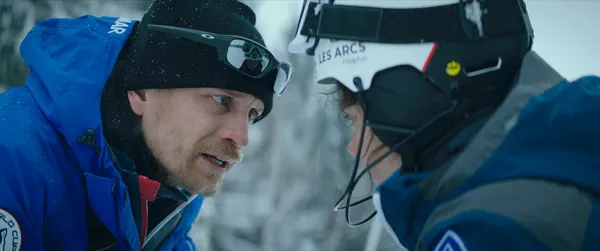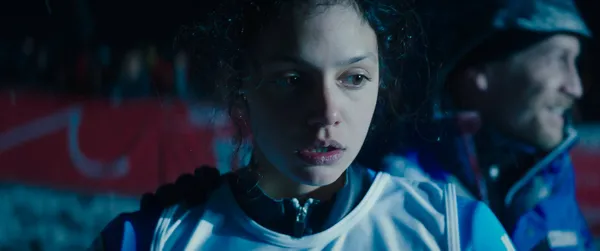“Woo-hoo Reechard!” yells filmmaker Charlène Favier down the Zoom-line from a virtual Paris as part of the 23rd UniFrance Rendez-vous with French Cinema earlier this year. We’ve been Facebook buddies since her first film Slalom started the rounds in festivals and previews all over France towards the end of last year yet because of cinema closures has still to be released on its home ground.
It’s the first time we have spoken in person - a moment to treasure. Favier is a compulsive social media practitioner. Only a few hours after our interview she has been posting pictures of herself on the train back to Marseille, where she now lives.
The subject of Slalom - abuse and control in the competitive world of skiing although it could be any domain - has been buzzing around in her sub-conscious for around five years. Part of it emerged in her short film Odol Gorri (2020 César Award for Best Short Film), which dealt with a young girl trying to find her identity - and with the same lead actress from Slalom, Noée Abita, who plays Lyz and is now being much touted in the awards arena, recently winning the Lumière Award for best newcomer.
 |
| Slalom director Charlène Favier: 'For me, film is something very personal and organic' Photo: Charlène Favier |
“When I joined the scriptwriting lab at the Fémis [the fabled Paris-based film school] I didn’t really have a subject apart from the idea of female resilience in confrontation with authority. Then as I started writing, the memories came back to me in a flash. It is not autobiographical in the true sense of the word. I did indeed experience someone having a hold over me, but in another sporting context. I preferred to use fiction because it allowed me to take a step back from my own story. Around me, I heard many stories of young girls who had experienced what I talk about in the film. I have received many accounts. For me, film is something very personal and organic. I’m not someone who intellectualises things and, until now, all my films start from something very intimate.”
Favier grew up in Val d’Isère and as an impressionable child the atmosphere of the place exerted a strong effect. “I am a very visual person so it was really the picture or the frame that pushed me to tell the story. I wanted to put the audience inside the feelings of the young girl. She is lost in this place which is weird, beautiful and a nightmare all at the same time. When I grew up there I was always facing the mountain and in a way, it was telling me something about my life. It’s still a bit like that. I don’t believe in God but I believe in nature. Sometimes this energy is really relating to what you are feeling in your life. I wanted to try to put that in my film.”
She admits that the making of the film itself was a therapeutic experience. It took her a couple of years to understand what she should be writing about. “Then I began to realise it had to be a story about sexual abuse. That discovery was hard for me … it took me two years to understand what I was writing. It was my producer who told me that is what I should be writing about. In a way, it was to do with me not realising that I did not want to write about my own story but the producer did help me to get over that. So yes it was a very therapeutic journey. And I changed so much and I grew up so much to the extent that I feel freer now. This film is more than just a film for me - it was life-changing. It took me a long time to face up to face the fact that I had been a victim. It was something that had been hanging over me … and now I feel I have been released,” she said.
Resonances from the #MeToo movement which came to the fore three years after she had started writing, provided “some courage and support. It came at the time when I realised that I was doing a film steeped in the subject. It helped me to face my own story and demons. After the stories came out in the media about sexual abuse in sport I realised the film was not just a personal story but a universal one”.
 |
| Jérémie Renier and Noée Abita in Slalom. Charlène Favier: 'I had never experienced such fluidity with my actors before even on my short films' Photo: UniFrance |
Favier discovered that it wasn’t easy to finance for such a subject. She had a budget of around a million euros which was extremely tight for five weeks of shooting. “Nobody wanted to finance a film dealing with that subject, but now, of course, everyone wants to hear about such a topic. Five years ago that was not the case,” she explained.
She already had a meeting of minds and sensibilities with Abita after they encountered each other at the Cannes Film Festival in 2017. With Jérémie Renier there was a similar complicity. “He was born on 6 January and my birthday is the 5th. He is also a self-taught, a bit like me, so there were many similarities in our lives. I did not have to explain things … he just understood what I wanted to achieve really quickly. Even with the difficult sex scene there were no problems and it was easy to shoot. I had never experienced such fluidity with my actors before even on my short films.”
Favier, now in her mid-thirties, travelled around a lot as a youngster, losing herself “in many different situations”. She spent time in Australia in a hippy community - and started to film their story for her first documentary Is Everything Possible Darling? She lived in a rusty old bus which inspired the name for her production company Charlie Bus Productions established when she was 24. She had spells in New York and London where she attended the Jacques Le Coq School of mime and circus skills.
She wants to shoot a second film quickly. “Winter sports really nurtured my childhood, especially skiing and surfing. I really want to make another film, this time in the surfing world. Once again around a quest for identity and with women in the foreground. It will always be a bit autobiographical. But I also have other, less autobiographical projects. We’ll see what materialises!”
And with that my Facebook buddy disappears from the screen but assuredly not for long.
Slalom will be available to watch on Curzon Home Cinema from Friday.






















